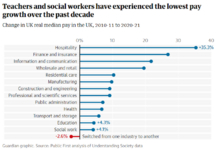My wife was well shafted, sixty to sixty seven, only found out in her early fifties...flipping ouch.
Be warned, the state old age pension was designed for the last few years of life, not the last few decades.
I have little choice but to continue part time working into my seventies...if I stayed at home with her all day there would be murder.
Be warned, the state old age pension was designed for the last few years of life, not the last few decades.
I have little choice but to continue part time working into my seventies...if I stayed at home with her all day there would be murder.



